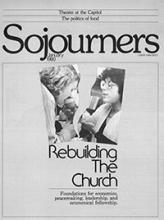I recently read the book Servant Leadership by Robert K. Greenleaf. He says we live in the age of the anti-leader. Some intelligent and serious-minded people, who often have a strong egalitarian view of the individual, denigrate leadership and urge a leaderless society. Others simply ignore leadership as a critical problem; our vast educational structures devote very little care to nurturing leaders.
Therefore, Greenleaf says, we are in a crisis of leadership. Vast numbers of educated people make gross errors in choosing whose leadership to follow. Able and dedicated servants receive little incentive to take the risk of asserting leadership. By default, far too much of the inevitable leadership is in the hands of the gross, the self-seeking, and the corrupt. The outlook for better leadership in our leadership-poor society is not encouraging.
Greenleaf goes on, however, to talk about leadership emerging from a community of love and caring. He says "a new moral principle is emerging which holds that the only authority deserving one's allegiance is that which is freely and knowingly granted by the led to the leader in response to, and in proportion to, the clearly evident servant stature of the leader. Those who chose to follow this principle will not casually accept the authority of existing institutions. Rather, they will freely respond only to individuals who are chosen as leaders because they are proven and trusted as servants."
The question of leadership is one of very real consequence for us in our strategy for renewing or rebuilding the church because when we talk about rebuilding the church we are really talking about a reformation of ministry. Such a discussion touches the church at one of its weakest points.
Read the Full Article

